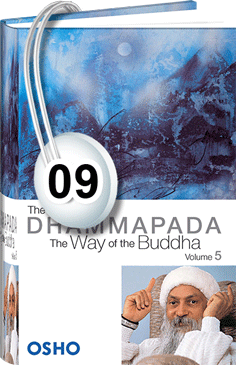See the World as It Is
Individual Talk
From:The Dhammapada: The Way of the Buddha, Vol. 05
In stock
"The first sutra: Do not live in the world
in distraction and false dreams,
outside the law.
"It is one of the most misinterpreted sutras of Buddha...."
in distraction and false dreams,
outside the law.
"It is one of the most misinterpreted sutras of Buddha...."
"The first sutra: Do not live in the world
in distraction and false dreams,
outside the law.
"It is one of the most misinterpreted sutras of Buddha...."
Osho continues:
in distraction and false dreams,
outside the law.
"It is one of the most misinterpreted sutras of Buddha...."
"The sutra says: Do not live in the world in distraction and false dreams, outside the law. It does not say: 'Do not live in the world.' It says: 'Live in the world, but do not live in distraction and false dreams.' Live in the world, but do not live outside the eternal law of life and existence.
"Live in the world, but be not of it. Live in the world, but do not let the world live in you.
"If it had been understood the way I understand it, the whole history of Buddhism would have been totally different, and not only the history of Buddhism but the whole face of humanity would have been totally different. Because the sutra was understood as against the world, the Buddhists became life-negative. They became more interested in dying than in living. They became more interested in suicide – slow suicide, gradual suicide. Suicide became their goal. This is a perversion; a perversion of a great master and his great words.
"The words are clear: Do not live in the world in distraction and false dreams, outside the law. Live in the world without distraction, without dreams, and in communion with the law. His expression is a little negative. His expression is always a little negative, for a certain reason. Rather than speaking in an affirmative way, Buddha always says the same thing in a negative way. The reason is that when you affirm something it becomes so definite, so solid, that people tend to follow it blindly; hence Buddha uses the negative expression. That way he gives you freedom to analyze, to meditate, to find out on your own. He never says what is, he always says what is not; he defines through the negative. It is a beautiful device for those who can understand, but for those who cannot understand, it is a dangerous device because they will become victims of negativity.
"Buddha had to choose the negative way of expression, because for centuries before him religion was always expressed in the affirmative way, and the affirmative way had become a burden on people's being. He changed the whole of religious expression. He would not say: 'God is'; he would only say: 'Become absolutely empty and then see what is.' This is just indicating a way very vaguely, so you cannot cling to it. Otherwise people are clingers: they will fall upon anything and they will possess it.
"Buddha is elusive, you cannot catch hold of him. He says: 'Be empty and see.' He says: 'Let there be no mind and then see.' He never defines exactly what will happen when there is no mind."
"Live in the world, but be not of it. Live in the world, but do not let the world live in you.
"If it had been understood the way I understand it, the whole history of Buddhism would have been totally different, and not only the history of Buddhism but the whole face of humanity would have been totally different. Because the sutra was understood as against the world, the Buddhists became life-negative. They became more interested in dying than in living. They became more interested in suicide – slow suicide, gradual suicide. Suicide became their goal. This is a perversion; a perversion of a great master and his great words.
"The words are clear: Do not live in the world in distraction and false dreams, outside the law. Live in the world without distraction, without dreams, and in communion with the law. His expression is a little negative. His expression is always a little negative, for a certain reason. Rather than speaking in an affirmative way, Buddha always says the same thing in a negative way. The reason is that when you affirm something it becomes so definite, so solid, that people tend to follow it blindly; hence Buddha uses the negative expression. That way he gives you freedom to analyze, to meditate, to find out on your own. He never says what is, he always says what is not; he defines through the negative. It is a beautiful device for those who can understand, but for those who cannot understand, it is a dangerous device because they will become victims of negativity.
"Buddha had to choose the negative way of expression, because for centuries before him religion was always expressed in the affirmative way, and the affirmative way had become a burden on people's being. He changed the whole of religious expression. He would not say: 'God is'; he would only say: 'Become absolutely empty and then see what is.' This is just indicating a way very vaguely, so you cannot cling to it. Otherwise people are clingers: they will fall upon anything and they will possess it.
"Buddha is elusive, you cannot catch hold of him. He says: 'Be empty and see.' He says: 'Let there be no mind and then see.' He never defines exactly what will happen when there is no mind."
| Publisher | Osho International |
|---|---|
| Duration of Talk | 114 mins |
| File Size | 29.52 MB |
| Type | Individual Talks |



The information below is required for social login
Sign In or Create Account
Create New Account